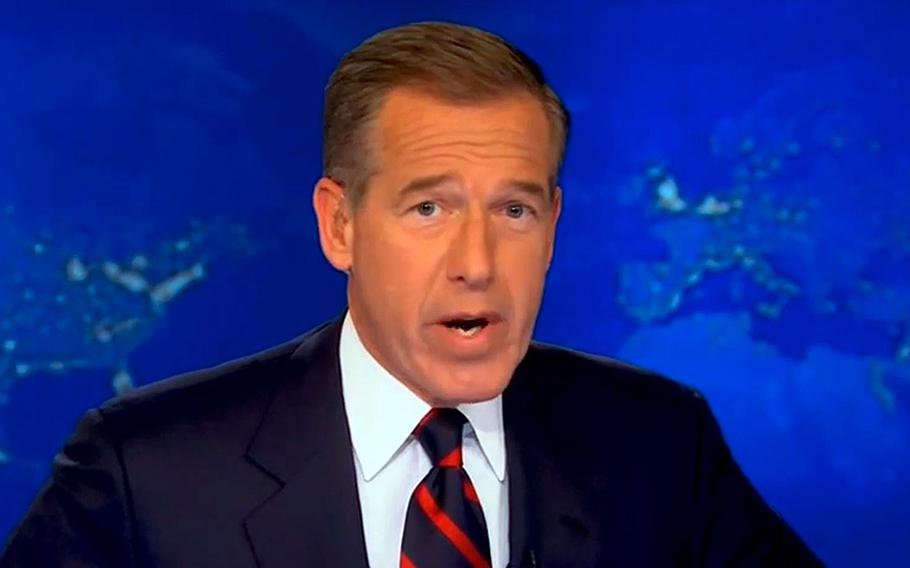
A video screen grab shows NBC News anchor Brian Williams apologizing on Wednesday, Feb. 4, 2015, for incorrectly stating that he was in a helicopter that was hit by an RPG in Iraq in 2003. (NBC YouTube)
WASHINGTON — NBC Nightly News anchor Brian Williams, facing withering criticism for “misremembering” events in Iraq in 2003, is voluntarily taking a leave of absence while the network investigates his reporting.
On Friday, NBC Universal sent out a news release in which the news division’s president, Deborah Turness, said in part:
“We have a team dedicated to gathering the facts to help us make sense of all that has transpired. We’re working on what the best next steps are.”
On Saturday, Williams sent a note to the NBC News staff, which said in part:
"[It] has become painfully apparent to me that I am presently too much a part of the news, due to my actions.
"As Managing Editor of NBC Nightly News, I have decided to take myself off of my daily broadcast for the next several days, and Lester Holt has kindly agreed to sit in for me to allow us to adequately deal with this issue."
The Iraq issue erupted online when Iraq veterans took umbrage at a news report in which Williams used a ceremony honoring a retired command sergeant major at a New York Rangers hockey game to repeat the story that his aircraft was forced down in Iraq.
Days later, Williams admitted the claim was false after Stars and Stripes’ reporter Travis Tritten contacted NBC News to ask for comment to statements by some servicemembers challenging the veteran anchor’s version.
But Williams’ apology, delivered on NBC Nightly News, failed to stem the criticism. He admitted his helicopter was not hit, but claimed that he “was instead in a following aircraft” and said he had bungled the tribute to a veteran.
The apology was met with scorn and derision, particularly online, and deeper scrutiny followed.
Some media outlets have questioned Williams’ description of what he saw while reporting on Hurricane Katrina. In an interview a year after the storm, he described seeing a body floating down the street from his hotel window in the French Quarter of New Orleans, which was not severely flooded.
Early Friday, news organizations reported that NBC News had launched an internal investigation into Williams’ reporting. The New York Times reported that NBC executives canceled meetings and said that the issue was absorbing all of their focus.
Tall tale
Williams did not mention in his reports from Iraq in 2003 that his Chinook had been hit by ground fire.
But by 2013, he told Alec Baldwin on his public radio show that “I had no business being in in Iraq with rounds coming into the airframe.”
When Baldwin asks if Williams thought he would die, he replies, “Briefly, sure.”
Weeks later he told David Letterman on air that “two of the four helicopters were hit, by ground fire, including the one I was in” — “No kidding!” Letterman interjects — [by] “uh, RPG and AK-47.”
When the hockey game report hit the air, some soldiers called him on it.
The claims bothered several soldiers aboard the formation of 159th Aviation Regiment Chinooks that were flying far ahead and did come under attack March 24, 2003, Tritten wrote.
One of the helicopters was hit by two rocket-propelled grenades — one did not detonate but passed through the airframe and rotor blades — as well as small arms fire.
“It was something personal for us that was kind of life-changing for me. I know how lucky I was to survive it,” said Lance Reynolds, who was the flight engineer. “It felt like a personal experience that someone else wanted to participate in and didn’t deserve to participate in.”
Reynolds said Williams and the NBC cameramen arrived in a helicopter 30 to 60 minutes after his damaged Chinook made an emergency landing at an Iraqi airfield near Objective Rams, a temporary base being hastily set up near Najaf in southern Iraq.
Soon after the Stars and Stripes report, a media feeding frenzy began. Tritten appeared on several news shows as cable news followed up. Social media users mocked Williams mercilessly.
Reactions among the soldiers contacted again after the issue exploded was mixed. Some felt the record had been corrected, and just wanted to move on. Others felt the apology was half-hearted, and perhaps forced on a man who never would have come forward otherwise.